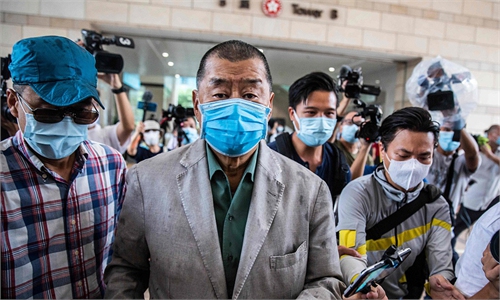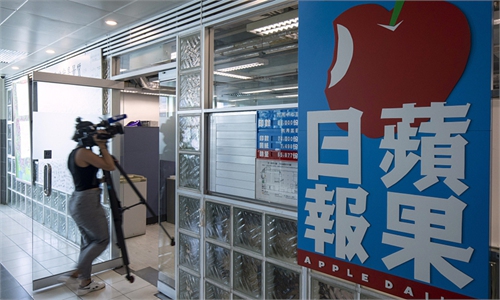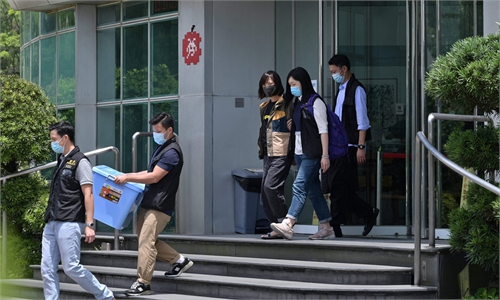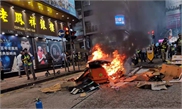Apple Daily closure ends West's political fantasies
Small-scale lamentation over HK secessionist tabloid insignificant compared to city’s overwhelmingly positive change
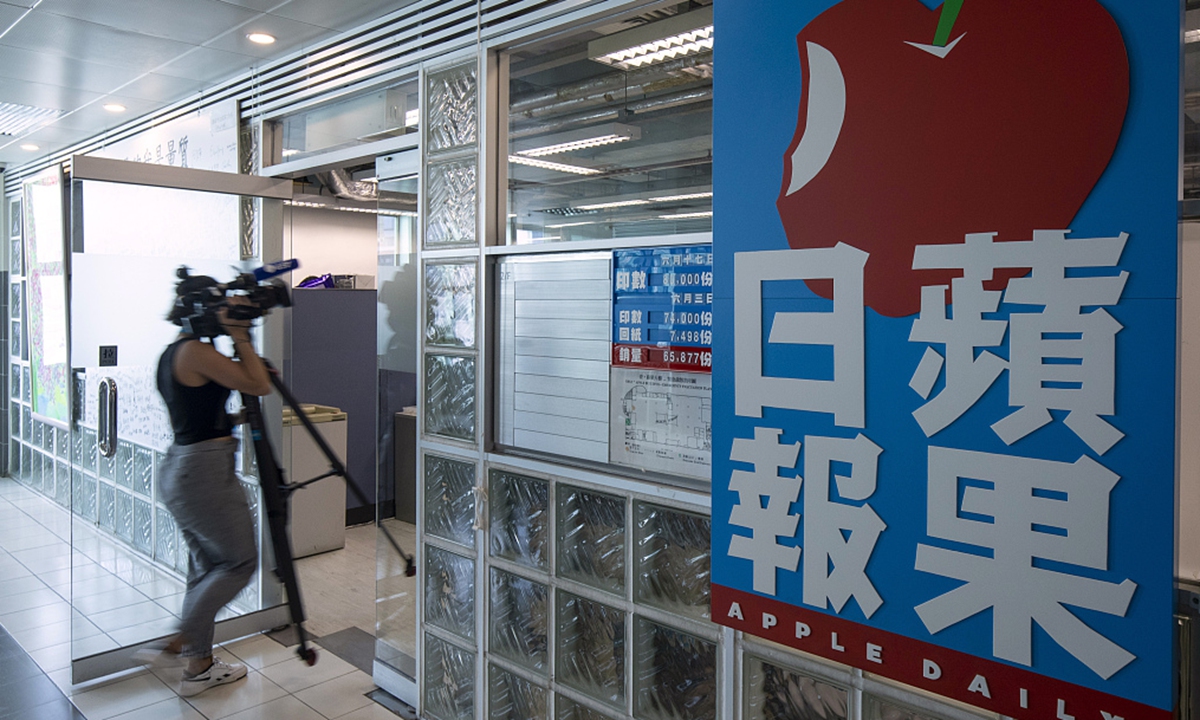
Apple Daily file photo: VCG
As pictures circulated on social media on Thursday showing a number of local residents lining up in front of newsstands seeking to get a copy of the final edition of Apple Daily, with some trying to amplify a sentiment of sadness by calling it a “painful farewell,” local officials and scholars in both Hong Kong and the mainland said such small scale-lamentation remains insignificant in the face of the overwhelmingly positive change the once riot-plagued city has experienced over the past years.
The secessionist tabloid, depicted by Western politicians and media as the so-called defenders of freedom of speech, issued its final hard copy on Thursday, after some of its senior executives were arrested on suspicion of violating the national security law for Hong Kong. HK$18 million ($2.3 million) in assets was also frozen during the ensuing investigation.
While a small proportion of readers called to “stand with Apple Daily” on a rainy night, trying to create an emotional scene of sounding an elegy for the paper, more Hong Kong people felt relieved, some observers said, as the shutdown of the 26-year-old newspaper, founded by modern-day traitor Jimmy Lai Chee-ying, is a symbolic move to bring the practice of the “one country, two systems” onto the correct path by ending an era when foreign proxies and secessionist forces could meddle in China's internal affairs by cultivating agents like Lai and his media group.
With the national security law and the electoral reform for Hong Kong, officials and scholars in the mainland and in Hong Kong see fundamental positive changes to the city’s political environment over the past year. Despite that foreign politicians like UK Foreign Secretary Dominic Raab continued to slam China by calling the shutdown of Apple Daily a “forced closure,” claiming it delivered a heavy blow to “freedom of speech,” more local residents realized that the secessionist outlet having gone far beyond being a press agency.
The closure would also help end the West’s political fantasies by using relevant anti-government radicals to exploit Hong Kong, which tried to cause a “color revolution” against China and subvert state power, experts said.
From Thursday on, the closure of Apple Daily will save Hong Kong at least 300 million pieces of wasted paper annually, as one copy used to be printed with 10 pages of paper every day, Leung Chun-ying, former chief executive of the Hong Kong Special Administrative Region, said in a public post on Thursday.
Boundaries of the rule of law
After the board of Next Digital, the parent company of Apple Daily, announced in a public statement on Wednesday that the tabloid will close down on Saturday amid mounting financial pressure to maintain normal operations, Apple Daily said via its website that it would issue its last edition on Thursday, with its website to stop updating at midnight.
On Thursday, there was no content on its website but a short notice for readers. The final edition ran a front page picture showing staff illuminating the flashlights on their phones and waving to supporters at the headquarters of the tabloid, creating an emotional moment over the death of the paper, which claimed to be the “paper of Hong Kong residents” over the past two decades.
The decision by the board came after Hong Kong police arrested on June 17 the paper’s editor-in-chief, Ryan Law Wai-kwong, CEO of Next Digital, Cheung Kim-hung,and other senior staff, and the seizure of its assets in its second raid in a year while Lai, the paper’s founder, was sentenced to jail facing multiple charges including collusion with foreign forces in violating the national security law for Hong Kong.
Apple Daily represented both anti-China sentiment and opposition to the Communist Party of China, having played an active role in working with the US to arouse chaos in Hong Kong and help plan, finance as well as organize rioting activities, which has gone against the successful practice of the “one country, two systems,” Lau Siu-kai, vice-president of the Chinese Association of Hong Kong and Macao Studies, told the Global Times on Thursday.
“It has been a miracle the paper could have survived until now, underscoring the central government’s patience and tolerance,” Lau said.
When the US stepped up on curbing China and the Chinese central government decided to lift the city out of chaos with the enactment of the national security law for Hong Kong, the closure of Apple Daily was inevitable, Lau noted.
When running anti-China and anti-local government stories, Apple Daily ran short, eye-catching headlines with sensational and sometimes fearless reporting styles, which, in the eyes of many local residents, served much more than a newspaper. Local newspaper Wen Wei Po also recently came up with 100 lies published by Apple Daily over the years, shedding light on a number of false information and conspiracies run by the tabloid with some deepening the misunderstanding of Hong Kong residents about the mainland.
During the anti-government protests that turned into a citywide rampage in 2019, Apple Daily ran sensational stories calling out alleged police brutality and posted slogans calling for “Hong Kong independence.” Lai had also actively advocated for foreign sanctions on China and the Hong Kong SAR, and he flew to the US in meetings with former US officials such as Mike Pence and Mike Pompeo.
While some foreign journalists and observers lamented the closure of Apple Daily on social media, claiming it to be "an end of an era," Chinese experts said that it indeed marked the end of an era when foreign proxies and secessionist forces meddled in China's internal affairs, and tried to instigate a “color revolution” in Hong Kong, and the era would exit political life for good.
“It is also a heavy blow to foreign proxies’ established networks in instigating a ‘color revolution’ in Hong Kong, completely ending their political fantasies in igniting a so-called revolution of our times and attempts from the West to subvert state power in China through Hong Kong,” Tian Feilong, an associate professor at Beihang University's law faculty and a member of the Chinese Association of Hong Kong and Macao Studies, told the Global Times on Thursday.
“It is indeed an end of an era when the media was used to create chaos in Hong Kong, which also turned a new page for the city in embracing stability and prosperity,” Tian said.
Fundamental changes
Facing the latest criticism from the EU, UK and the US over the Apple Daily-related issues, the Office of the Commissioner of the Ministry of Foreign Affairs, the Chinese Mission to the EU and Chinese Foreign Ministry denounced those remarks, staging strong opposition to the so-called concerns over free press and urged them to stop playing the “Hong Kong card” in pressuring China.
“Stop using press freedom as a pretext as China doesn't buy it ,” the office of commissioner said in a public statement on Thursday.
With the support of the central government, Hong Kong has seen fundamentally positive changes as the national security law for Hong Kong completely changed the situation of social turmoil and citywide violence, helping to ensure national security in the city, and electoral reform for Hong Kong will help implement the principle of only patriots governing the city, Carrie Lam, chief executive of the HKSAR government, said at a public event on Thursday.
Lam also said that she is confident Hong Kong will embrace a brighter future regarding its economy, social livelihoods and development.
On the occasions of celebrating the 24th anniversary of Hong Kong's return to China, the centennial of the founding of the Communist Party of China and the first anniversary of the national security law for Hong Kong taking effect, more Hong Kong residents cheered the exit of foreign proxies like Apple Daily from local political life while experts considered that amid overwhelming changes in Hong Kong society, major opposition groups including the Hong Kong Alliance and the Civil Human Rights Front need to adjust their behaviors to meet the new requirements of the law.
“Hong Kong people today understand the central government’s determination and capability to bring the political practice of Hong Kong back onto the right track. The city has also entered a new phase of development as the national security law and the electoral reform for Hong Kong largely reduced the room of activities for anti-China forces,” Lau said.

